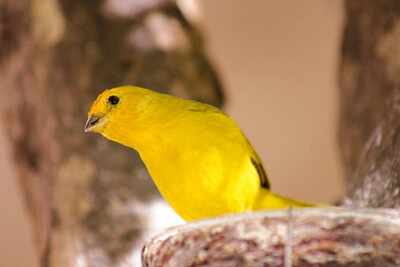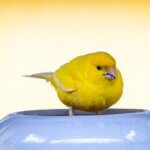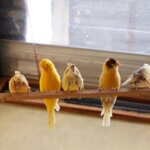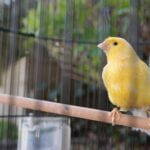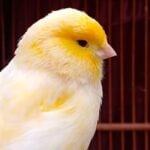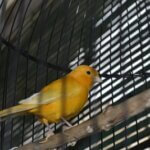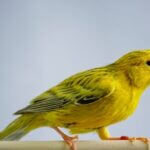Water is essential for aiding digestion, keeping the metabolism functioning, and cooling the body during hot weather. Dehydration can have life-threatening consequences for canaries.
Sometimes, not drinking water indicates an issue with the water bowl, the type of water, or the canary’s health. In other situations, a lack of thirst is due to the temperature or the bullying.
How Long Can Canaries Go Without Water?
A canary needs 200-300 ml of water per day, equivalent to 20% of its body weight.
Canaries need a constant supply of water throughout the day. If they don’t get sufficient hydration, they can quickly become dehydrated and die in as little as a day.
What Happens If A Canary Doesn’t Drink Water?
Dehydration is a serious medical condition for birds. While many humans live in a state of semi-dehydration, for canaries, it immediately damages a canary’s health.
The signs of dehydration in canaries include the following:
Sunken Eyes
If a canary is dehydrated, its eyes will appear sunken or dull, and the skin surrounding its eyes will be wrinkly. This can adversely affect a canary’s ability to see and navigate the world.
Dry Mucous Membrane
Severe dehydration causes the mucous membrane inside a canary’s mouth to dry up, making swallowing and eating difficult. This is paired with the inside of the beak appearing sticky.
Reduced Skin Elasticity
According to Frontiers in Ecology and Evolution, water is critical for maintaining cell turgidity in birds.
This is where a cell swells due to the absorption of fluid, maintaining the elasticity of the canary’s skin. Therefore, if a canary is dehydrated, its skin will become weak, thin, and more prone to injury.
Lethargy and Weakness
Canaries are active and curious birds that spend much time flying around or exploring their environment.
However, a canary can’t maintain its normal energy levels when dehydrated. Thus, it’ll become lethargic and weak, unable to hop around or even forced to stay at the bottom of the cage.
Less Pooping
Water promotes healthy bowel movements. When deprived of water for long periods, a canary’s poop will be dry and lack the normal, pasty consistency it should have.
This can lead to constipation, which causes a reduction in the amount and frequency of poop. In more severe cases of dehydration, a canary’s bowel movements may cease altogether.
Why Won’t My Canary Drink Water?
Canaries may sometimes refuse to drink water, which means something is wrong with them or their environment.
Here are the main reasons why canaries stop drinking and how to react:
Water Is Contaminated Or Stale
Canaries have sensitive digestive systems that don’t react well to germs and bacteria. For this reason, they’re cautious about water quality.
If a canary’s water bowl is dirty or contaminated with droppings or other debris, it might refuse to drink it. Leaving a canary’s water unchanged for too long may become stale and smell unpleasant.
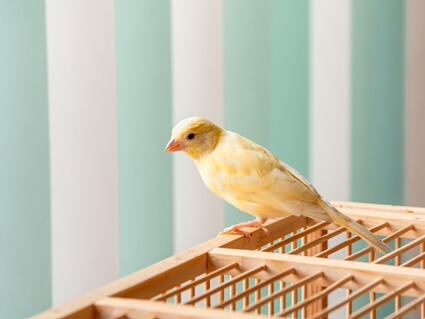
Canary Might Be Sick
If a canary has an illness, it might be too weak to reach its water bowl. Ailments that produce symptoms like lack of appetite, lethargy, and loss of thirst drive can deter drinking.
Cold Weather
The amount of water a canary drinks (and how often) can fluctuate based on the weather. For example, canaries drink more during hot weather to replenish the amount lost in keeping themselves cool.
In cold weather, birds retain more water and don’t need to drink as much. So, if you notice your canary drinking less water during winter, this is a natural change.
Ensure it doesn’t appear sick or dehydrated and is still drinking.
Medication In The Water
When treating your canary for an illness or internal parasites, your vet could recommend adding medication to the canary’s water before offering it to drink. If the medication has a strong scent, taste, or color, it might notice something is off and refuse to drink it.
Most vets are aware of this tendency and recommend odorless and tasteless treatments.
However, depending on the medication, your vet might recommend blending fruit or vegetable juice into the drink. This will ensure the medical additive is masked and your canary is better motivated to drink.
Water-Rich Diet
A canary’s diet affects the amount of water it drinks. If it feeds on many vegetables and fruits (which contain high amounts of water), this supplements a canary’s water intake.
So, a canary may not need to drink water regularly, as it gets enough from the food.
Afraid
If you’ve recently bought a canary, it might be reluctant to drink due to its fear of being in a new environment. As prey animals, canaries are anxious when transitioning to new spaces.
Therefore, they hide and keep from moving to avoid predators and other threats.
Approaching the food or water bowl may not feel safe until the canary adjusts and calms down. Fortunately, this issue goes away as it acclimates to its new home and feels comfortable.
Of course, canaries still need to drink water daily, or they might die. Most canaries know this and brave the water bowl when no one is around, so you may not see them drinking.
If you’re concerned, add more water bowls in different areas or move the primary one closer to your canary’s favorite hiding spot, as this will make staying hydrated a less risky affair.
Bullying by Cage Mates
Canaries prefer to be housed alone, but they can get along with other members of their species, provided there’s enough space and resources to go around.
Canaries will fight and guard food or water bowls if these conditions aren’t met.
According to PLoS One, male canaries are particularly territorial and aggressive toward other males. So, if you keep two or more male canaries in a shared cage with a single water source, the more dominant one in the group might stake claim to it.
You may need to offer extra water bowls or separate the two.
How Do You Get Canaries To Drink Water?
Ways to encourage your canary to drinking water include:
Clean The Water Bowl
The presence of dirt and debris (such as feathers, droppings, and scum) inside a canary’s water bowl can discourage drinking. Clean the bowl daily to ensure the water is safe and free from contaminants.
Replace The Water
Allowing a canary’s water to sit for extended periods will cause it to become stale and smelly, thus making your canary reluctant to drink it.
To fix this, replace the canary’s water at least once daily to keep it fresh and palatable.
More Than One Source Of Water
Provide several water bowls because this gives the canary more drinking options.
Water Additives
If a canary is reluctant to drink water, either due to medication or because it finds the taste unpleasant, adding fruit or vegetable juice can be beneficial.
Exercise
Canaries feel thirsty after a good workout, so they seek water to rehydrate and replenish their lost energy. If an otherwise healthy canary drinks less water, let it fly outside its cage for a while.

